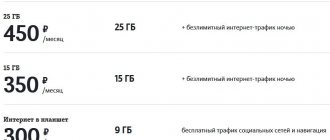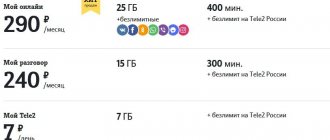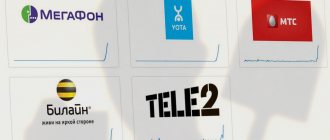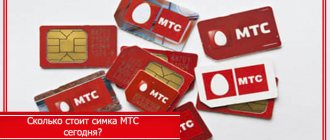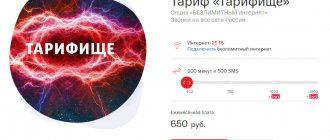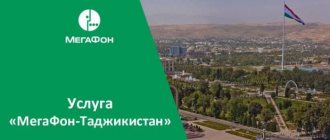The constantly growing demand for cellular communications and mobile Internet services in Russia is fully satisfied by 4 companies: MTS, Megafon, Beeline and Tele2. The remaining operators (Yota, Tinkoff Mobile) occupy a tiny market share and are not even included in the ratings regularly compiled by Roskomnadzor. According to them, the two leaders - Megafon and MTS - are neck and neck, periodically overtaking each other.
Ratings are based on more than 40 factors. Average users, when choosing which is better to connect - Megafon or MTS, rely primarily on the opinions of other subscribers, the cost of tariffs and their own feelings.
Features and comparison of operators
Choosing the best operator - MTS, or Beeline, or Megafon - can begin by determining their position in the Russian cellular communications market. in 1993 in St. Petersburg and at first covered only the North-West of the country.
In 2021, Megafon has 77 million subscribers in Russia, Abkhazia, South Ossetia and Tajikistan. In many ways, this is a pioneering operator. It is ahead of its competitors:
- introduced tariffs in rubles at the federal level;
- started communication via SMS;
- started catching the subway;
- introduced 3G standards in 2007, 4G, LTE in 2013 (mainly through the purchase of Yota), LTE+.
MTS also appeared in 1993, but in Moscow. In 2021, its network has 80 million subscribers in Russia, and together with Ukraine, Belarus, Armenia and Turkmenistan - 110 million people. The company initially grew in breadth not only geographically. She is the best:
- by the number of service salons (5.7 thousand in 2021) and the size of the call center;
- range of services (cellular communications, broadband access, home TV, telephone, business services, bank, etc.),
- number of branded devices and online store catalogue, etc.
Reference! Both companies are working on the 5G standard in 2021, together with Huawei and Nokia, and have already shown prototypes with data transfer speeds of over 1 GB/sec.
These are not all the achievements of the operators, but in terms of experience and market presence they are approximately equal. In order to determine which connection is better when choosing a SIM card for your phone, you need to compare the tariffs and services of Megafon and MTS for communication and mobile Internet.
Choice by tariffs
Both operators offer customers a number of tariffs with a subscription fee, some non-prepaid and specific (for modems and calls abroad). At Megafon, the main line is “Turn on!” — these are 7 permanent TPs and 1-2 promotional ones only for new subscribers with the best conditions.
Megafon’s peculiarity is completely different tariff conditions for the same line. In one TP, a package of minutes works in Russia, and a megabyte works at home, in another it’s the other way around. In the third, free minutes and traffic are spent throughout the country, but not on calls to landlines. Before connecting, it is better to find out all the nuances of the tariff.
MTS has a proprietary Smart line and several package tariffs outside the series. A special feature of new TPs is their customizability. “Tariff” with unlimited Internet costs 650-1550 rubles. depending on the number of minutes and SMS. In “My Smart” you can choose packages from 10 to 20 GB and from 200 to 600 minutes, pay 500-700 rubles for it. and change during use. All rates apply when traveling within the country.
| The best MTS TPs | Best TP Megafon |
| “Tariff”: 800 rub./800 minutes/unlimited | “Look” (with unlimited traffic): 800 rub./750 minutes/unlimited |
| “Tariff”: 650 rub./500 minutes/unlimited | “Chat”: 650 rub./600 minutes/unlimited |
| “My Smart”: 700 rub./600 minutes/20 GB | “Look”: 750 rub./750 minutes/20 GB |
| Per second: 1 minute - 2.9 rubles. | Red Energy: 1 minute - 1.6 rubles. |
Megafon's tariffs with subscription fee are cheaper and better than MTS's. They are not configurable, but there are a lot of them, and the unlimited traffic option can be disabled and added again. They always have unlimited limits within the network (unlike Tarifishch).
Important! Megafon's comprehensive tariffs are more profitable. It is better to buy SIM cards just for calls from MTS.
Selection by Internet services
When choosing the best operator among Megafon and MTS based on options for mobile Internet, you need to compare:
- unlimited availability;
- cost and variety of Internet services for smartphones and modems;
- data transfer rate;
- traffic consumption features.
High data transfer speeds and almost universal 4G coverage are Megafon’s “features”. The operator builds base stations even where its other competitors are not present. In 28 regions of the Russian Federation, data download speeds for Megafon subscribers reach 300 MB/sec. The best record was set in Moscow - 1 GB/sec. MTS limit is 112-178 MB/sec.
Important!
Data transfer speed depends on many factors. The maximum recorded values are, rather, isolated cases. But Megafon’s average Internet speeds are also better - 9 MB/sec for loading pages and videos, 20 MB/sec for downloading versus 7-10 MB/sec for MTS.
Megafon has an option for unlimited Internet in your home region. It can be installed on the “Turn on! Chat", "See", "See+" and "Premium", but cannot be used in modems. At MTS, unlimited traffic is included only in the “Tariffishche” tariff plan, and is specially provided for modems (there are no limits, but the speed is limited to this value).
Comparison of the cost of Internet options:
| MTS | Megaphone |
| “Internet 4 Mbit/sec” (unlimited) - 750 rub. 7 GB - 500 rub. 15 GB - 800 rub. 30 GB (+ night unlimited) - 1200 rub. | 5 GB - 400 rub. 12 GB - 550 rub. 20 GB - 900 rub. 30 GB (+ night unlimited) - 1300 rub. |
| Speed extension: 3 GB – 300 rub. 5 GB - 400 rub. 10 GB - 500 rub. Turbo buttons from 100 MB to 20 GB - 30-900 rub. | Speed extension: 70 MB – 19 RUR. 1 GB - 210 rub. 5 GB - 450 rub. |
The greater the volume of traffic a subscriber needs, the better and more profitable MTS is for him. This operator has a more diverse range of services for extending access to the Network after the package is exhausted.
Important! It is worth considering the pricing features. Each session in Megafon is rounded up to 250 KB, in MTS - up to 100 KB. Under equal conditions, a Megafon subscriber's traffic will go faster than that of an MTS client.
Selection by contacts
The cheapest way to communicate is within the network. If friends and relatives use a certain operator, it would be better to choose the same one or connect a tariff with a package of minutes.
MTS offers a special set of services for families. The parent installs several applications on the child’s phone, through which he controls his location, balance, battery charge, and visits to Internet pages. User profiles are customized to provide the best level of security. You can share packages of minutes, messages and traffic with your loved ones.
Megafon offers similar services for geolocation (“Radar”), traffic and balance control. But MTS provides a comprehensive approach to the issue of the use of cellular communications by minors. For a family connection, this is the best choice.
Comparing connection quality
Each official website of the cellular operator has a coverage map. Here you can identify areas needed for walking or traveling. MTS has poor coverage. This is noted by Russian experts and users themselves. The areas highlighted in color show that the Internet functions well near large cities and metropolitan areas of federal significance. Beyond these zones, the connection no longer allows for maximum use of the service.
MegaFon has better communications than MTS, but worse than Beeline. Comparing the colored zones and the quality of service, we can single out this particular operator as the most popular.
Network coverage maps are automatically updated by a bot every hour. Speed maps are updated every 15 minutes. Data is displayed for 2 years. After this time, the oldest data is deleted from the cards once a month.
MTS and MegaFon have created a special working group to collaborate and exchange best practices in order to agree on a common approach to the deployment of IP communications throughout the country. This includes services such as Voice over LTE (VoLTE), Voice over Wi-Fi (VoWiFi), Video over LTE (ViLTE) and Rich Communications Services (RCS), which will provide enhanced messaging and communications capabilities for clients all over the country. MegaFon, MTS, Tele2 and VimpelCom have officially approved the general profile of VoLTE and ViLTE services in Russia. VoLTE has been launched by 467 operators in 153 countries to date, reaching 48 percent of the world's population.
MTS is in constant development, which affects the quality of service to citizens. Every year the network is expanded so that everyone can use the operator’s communications. Users note good connection when making calls in their home region. When traveling around Russia or abroad, the signal quality becomes very low. Employees undergo annual training and testing in order to help each client as much as possible. The signal does not always depend on MTS. Sometimes the client simply cannot understand the settings.
MegaFon is in demand among Russian citizens due to its reputation. People are used to the company having acceptable communications. But prices have increased dramatically, and the number of tariffs supplied has not increased. Users note a good signal regardless of the location of the subscriber (in the home region or not). MTS has excellent 2G and 3G reception. MegaFon has 2G, 3G and 4G. USB modems operate in towns, villages and villages, which is a huge plus.
When examining the map, you should pay attention to the types of Internet provided - 3G, 4G. Their distribution among MTS and MegaFon in Russia is different. Somewhere modern equipment has already been set up, but in other areas there is a deterioration in the services provided.
What about mobile internet?
In order to understand which operator is better to provide an Internet connection, you should study the following parameters:
- presence of unlimited;
- total cost;
- availability of additional Internet services that connect to smartphones and modems;
- the speed at which data is transferred;
- Traffic.
The highest data transfer speeds and 4G availability are available only from Megafon. Only this operator builds its towers where competitors cannot. They are present in 28 cities, and their transfer speed reaches 300Mb. Just recently a record was set in Moscow: Megafon’s data transfer speed reached 1GB.
Unfortunately, MTS cannot boast of such data. Their data transfer speed is 112-178 MB.
Please note that data transfer speeds vary by region. And large indicators appear in rare cases.
But Megafon can also boast of average Internet speed. It is 9 MB for viewing pages on the Internet and 20 MB for downloading various content. In MTS the figures are much worse: from 7 to 10 MB.
Megafon can also please its customers with unlimited Internet, which is valid only in the home region. It is installed on such tariffs as “Turn on. Communicate”, “Watch”, “Watch+”, “Premium”. The disadvantage of this option is that it connects to a modem from Megafon.
MTS also has unlimited traffic. But, it connects to such tariffs as “Tariffishche”. The user can also install unlimited Internet on a modem from MTS, but he will only have 4MB of traffic.
Thus, if a person always needs access to the Internet, then he should give preference to MTS. It is this operator that has a wide range of services that will help the client always have access to the World Wide Web at hand.
Summary
All mobile operators compared have their strengths and weaknesses.
- The share of dropped calls and undelivered messages is the lowest for MTS;
- Tele2 is the leader in terms of communication quality during calls;
- Megafon has the largest coverage map in the country;
- Beeline boasts the lowest prices for the same range of services;
- Yota offers the most flexible and responsive tariff designer.
The answer to the question which operator has the best Internet will be ambiguous. MTS uploads data faster, Megafon has higher download speeds, and Beeline has a more stable connection in the regions.
Choosing the best operator between MTS, Beeline, Yota, Tele2 or Megafon is not so easy. To understand what is best for you, look at user reviews in your region, compare tariff plans, and ask family members, colleagues and friends for their opinions.
Pros and cons of MTS
The best advantages of MTS include:
- MTS is not only cellular communications, but also home Internet and television, and a bank. By connecting a SIM card and broadband access, you can significantly save on the subscription fee. And credit card holders may not pay for the phone at all.
- Customizable packages of minutes and gigabytes within one tariff.
- Inexpensive calls and SMS to TP without subscription fee.
- The best range of Internet options, including unlimited ones.
- Services for family connections.
- Good level of stability of the cellular network and Internet connections (0.8 and 0.7% of failures, respectively, according to Roskomnadzor).
Disadvantages of MTS:
- The weak link of the operator, judging by customer reviews, is technical support. It is difficult to reach a consultant; the standard wait time during peak hours is more than 10 minutes.
- A large number of illegal write-offs. Several mini-services, initially free, have been added to each tariff and new SIM card. But many of them benefit the subscriber (for example, the “First Internet package” on Red Energy is activated automatically at 12 rubles per day if the client starts using traffic without any option. This way the number is protected from being charged for each megabyte at 9.9 rub.).
- The largest percentage of undelivered messages (2.4%).
Where is the best place to make calls?
MTS specializes in calls: It has different tariffs from two hundred to three thousand minutes and packages with extras. minutes. Just remember that after the package of minutes ends, calls to other subscribers within the network will be free, but calls outside will cost money. Plus, from this operator you can purchase additional packages for two hundred, four hundred eight hundred and one thousand two hundred minutes, which is very convenient and something Megafon does not have. Another advantage of MTS is its “Constructors” tariffs, in which you set how many minutes you want to have, such as the above “Personal” tariff.
Megafon can only boast a larger reserve of minutes on a certain tariff (up to five thousand minutes). However, Megafon has its own ace up its sleeve - this is the “Switch to 0” tariff without a subscription fee, that is, you only pay for what you used.
This is very popular with some users who leave reviews, noting that the tariff is ideal for people who do not use calls and the Internet much.
Which is better MTS or Beeline in 2021 - comparison of tariffs
To finally decide who is better, MTS or Beeline, it is necessary to make a detailed comparison of tariff plans for calls. Mobile TeleSystems stand out by providing the ability to independently configure your TPs in detail, where you can independently specify the required amount of Internet, minutes and messages. These indicators affect the final price.
Here we can highlight: the volume of the Internet. The minimum package is 5 GB, the maximum is 30 GB;
number of minutes and messages, which can vary in volume from 300 to 900 units. Beeline also distinguishes 2 main directions:
The cost of MTS services aimed at mobile communications is lower than that of its competitor. However, reviews on authoritative resources indicate a larger Beeline coverage area, which may be a key factor in some cases for the subscriber.
What does Yota have?
Yota is a subsidiary of Megafon, which stands out for its unlimited offers.
Has the following advantages:
- High transfer speed.
- No roaming when traveling around the country.
- The ability to independently create your own tariff plan. Provide a list of applications for which traffic will not be charged; there are a significant number of them to choose from. For a low price you will get unlimited access to social networks and instant messengers.
Minuses:
- Small coverage area. The company is very young and has not had time to expand into many regions.
- Complete dependence on Megafon.
This cellular provider specializes in network resources. There are several standard contracts that the operator provides:
| Name | Cost, per month | Amount of traffic, GB |
| #first | 420 | 2 |
| #second | 605 | 6 |
| #third | 3145 | 30 |
It is more profitable to collect a personal offer, taking into account your goals and requirements.
Advantages and disadvantages of Megafon
The best advantages of Megafon:
- It works where other operators are not present. In the capital and region, Megafon's 4G towers cover 40% of the territory.
- High speed Internet connection.
- Favorable package rates.
- Unlimited Internet is a connected service for voice TPs.
- Several tariff options for communication with CIS countries. Roaming with Megafon is cheaper than with MTS, with almost identical offers.
- Minimal number of cellular network failures (0.7%).
- Fast and efficient technical support (average waiting time for a specialist is from 0 to 2 minutes).
Disadvantages of Megafon:
- With the best speed, the operator shows the highest number of Internet connection failures - 3.7%.
- Expensive calls and SMS at simple rates. Internet on “Per Second” is paid at the base price, 9.9 rubles/MB. There are no “protective” options. If the subscriber’s smartphone decides to upgrade, the number’s balance may go into a deep minus.
- Internet sessions are rounded up to 250 KB.
Comparing two operators
In order to better understand which operator is better, the client must compare the positive and negative qualities of each of them.
Positive qualities of MTS:
- The operator offers not only cellular communications, but also home Internet, television, and banking services. If a client has purchased a SIM card and installed broadband Internet access, he saves significantly on the subscription fee. And if the client uses a credit card issued by MTS, then he may not put money on his phone at all.
- The client independently configures packages of minutes, gigabytes, and all these settings are carried out within one connected tariff.
- The user does not spend a lot of money for an SMS package connected to a tariff plan that does not have a subscription fee.
- The operator provides many additional Internet options, as well as unlimited services.
- The whole family can connect to the operator and save significantly on calls.
- The operator's cellular communications are stable, and the Internet connection is stable.
Disadvantages of MTS:
- The operator has poor technical support. Many clients note that sometimes they have to wait about 10 minutes for a consultant on the phone.
- Often the operator debits funds from the account on his own. Each tariff and new SIM card has a specific set of services. At first, the connections are free, but later they even help the subscriber. For example, the “First Internet Package” package provided for in the Red Energy tariff is connected automatically, and it costs 12 rubles per day, but without connecting additional services.
- The operator shows the highest percentage of undelivered messages. It is 2.4%.
Now let's figure out why Megafon is so bad and good.
Positive aspects of the operator:
- The operator makes cellular communications available in those regions where other cellular operators do not operate. Megafon has many 4G towers in Moscow and Moscow Region.
- Internet connection is provided at high speed.
- The client can choose from a variety of packages the one that is most suitable for him.
- Voice tariff plans have unlimited internet service.
- There are separate tariffs for calls to CIS countries, and the client can also choose the most convenient one for himself.
- Roaming provided by Megafon is much cheaper than that of other mobile operators. And the conditions for its provision are the same for all operators.
- The operator shows the minimum number of Internet connection failures. Its percentage is only 0.7%.
- The operator has fast and efficient technical support. Hotline workers usually answer the call within 2 minutes.
Negative aspects of the operator:
- At high speeds, the number of Internet connection failures increases. It is 3.7%.
- On simple tariffs there are very expensive calls. When you subscribe to the “Per Second” tariff, the cost of the Internet is 9.9 rubles per 1 megabyte. Moreover, there are no protective services provided for this tariff. Therefore, if the user decides to reboot the phone automatically when connecting to the Internet, then its balance may go into a strong minus.
- An Internet session is rounded up to 250 KB.
Operator coverage area: Beeline, MTS, Megafon, Tele2 in Moscow and the region
The 4G signal area of Tele2 and Yota is smaller than that of Megafon, MTS and Beeline. The first two suppliers work only in those localities where it is profitable for them.
The last three cover almost the entire territory of the Moscow region, since they have been operating in the cellular communications market for a long time, unlike Tele2 and Yota. However, all five operators work well in the capital itself. If you live there, when choosing, rely only on the tariffs (choose the most profitable for yourself) and customer reviews.
How did the operators compare?
We considered the tariffs of mobile operators that are part of the “Big Four”, that is, they have the largest number of subscribers in Russia. These are MTS, Tele2, Megafon and Beeline. The tariffs offered by operators for smartphones in the Moscow region were considered. Fares offered as part of promotions were not considered. If one operator had several tariffs in the category under study, then the cheapest one was selected. For example, when choosing a tariff for those who like to make calls, operators calculated the cost of a minute of call without taking into account additional options included in the package. Tariffs were ranked according to cost: from lowest to highest. Tariffs are current as of May 14, 2019. They may be changed in the future.
Who will you choose in the end?
Megafon is chosen by young people whose main need is high-speed mobile Internet. The operator ranks first in the number of subscribers using traffic only (more than 40% of the market). In addition, Megafon is better suited for residents of areas where others have poor or no reception at all.
MTS is an operator that offers comprehensive solutions for its clients:
- connection for communication and the Internet;
- MTS-Bank is a full-fledged financial structure in which you can even get a mortgage;
- home Internet, TV and telephony;
- monitoring and security systems, cloud and IT solutions, electronic document management and cash registers, etc.
MTS allows the subscriber to create a system that is completely tied to one service provider, and ultimately save money. This operator is ideal for business clients. It is also better suited for those who just need a phone to make calls.
What to connect to Yota or MTS
The Yota company relatively recently began providing its services in Russia and brought the trend of “tariff plan designer”. For the first time, customers were able to independently customize the TP for everyday use, choosing not only the number of minutes and Internet, but also a number of additional settings.
Although MTS has a better coverage area, Yota boasts a larger number of LTE Internet points. The support service also responds quickly to user requests. You can receive qualified assistance from both operators in the following ways:
- by calling the toll-free technical support number;
- using the form to send a text request from the client’s personal account;
- by directly contacting the nearest service office in your city.
Who was the worst
Based on the results of official and unofficial research, the “winner” of the title was. Subscribers are dissatisfied with the low network speed for a lot of money, the incompetence of employees and support services. In addition, when trying to switch to competitors while maintaining the number, managers are unreasonably delaying time, citing non-existent problems.
Statistics on the number of its subscribers also confirm the status of Beeline. In 2021, all other companies only increased this indicator, but the “yellow” ones managed to lose more than 900 thousand potential customers.
Switch between operators with your own number
If the subscriber made a mistake when choosing the best between Megafon and MTS, he can perform the MNP procedure - transferring the number along with the number capacity (3 digits after the prefix +7) to another operator. To do this, the following conditions must be met:
- the transfer is carried out by the owner of the phone or his representative with a power of attorney;
- within the home region;
- there are no debts on the number, it is not blocked;
- 2 months have passed since the last transfer.
The MNP procedure in Megafon is free, you only need to pay for the selected tariff. At MTS, the service costs 100 rubles, but the client immediately receives a SIM card with a temporary number from the Tariffishe TP and a 30% discount on the subscription fee for the next six months.
When determining the best operator, it is recommended to test the SIM cards of each of them in real conditions at home, at work, where the subscriber often visits. And you can use both Megafon and MTS numbers at the same time: most modern smartphones and tablets allow this.
Reviews from Muscovites about using 4G Internet from these operators
Mobile Internet MTS (Russia, Moscow) - One of the best, if not the best mobile Internet. For ten years, until December 2015, we were users of Megafon mobile communications and mobile Internet - smartphones, modem. There was nothing to compare with until the beginning of 2014. We were happy with what we had. Megafon was considered the best.
At the beginning of 2014, we received two MTS SIM cards with a Super MTS tariff and a mobile Internet option. The difference was striking in favor of MTS mobile Internet.
In December 2015, we finally said goodbye to Megafon and transferred our family numbers via MNP to Beeline to the “Everything for the Family” tariff. Everyone has a good tariff. One minus is a very modest internet package for three people.
We remain Beeline subscribers - a convenient and economical Beeline archival tariff “Everything for the Family”. But on the second MTS SIM cards it is precisely because of the high quality of the mobile Internet. Of course, in different regions and even within the same city there is different network coverage of cellular operators, including MTS. Based on personal experience and the experience of family members, including when compared with the mobile Internet of other cellular operators, I consider MTS mobile Internet one of the best, if not the best. As for the price, MTS is not a cheap mobile operator. In order to somehow save money, I transferred (not free of charge) the numbers of family members to the MTS Smart tariff for my own.
ltn777
https://otzovik.com/review_7207081.html
I’m not delighted with Megafon’s mobile Internet, I’ll say this right away, and I’ll explain it a little later. But I disagree with the twos and ones given to this operator. Although, if I had written this review at the time of the operator’s jamb, and such cases do occur, I would also probably have given one. In terms of the packages and tariffs provided, I am generally satisfied with the mobile Internet from Megafon. Or I’m just used to having to pay 350 rubles a month for 16 GB of Internet and have conditional unlimited use of social networks. But packages are packages, and the first thing is that the Internet works anywhere in the country. And that's the problem. Okay, I still agree that my village may have a poor coverage area. Although the network catches the maximum, but there is no Internet. But in the city, according to my foolish logic, there should be a good, stable Internet. And in general it exists, but periodically it disappears if you take specific places in our city. Naturally, we are talking about the city center, because the Internet should be the most stable in the center. But, alas, no. Be that as it may, I use Megafon’s Internet every day. It turns out that he is happy with it, since he did not switch to the Internet of another operator.
champion-max
https://otzovik.com/review_7048558.html
— Internet from Tele2 spoils your nerves. ADVANTAGES: Voice communication DISADVANTAGES: Internet. The quality of mobile Internet is, to put it mildly, disgusting! Constant interruptions of the Internet connection when working in 3G, and 4G appears very rarely (in any area of Yekaterinburg), only turning off and on data transmission or rebooting the smartphone helps. If the Internet sometimes works in 4G, then the speed is very low. For those who are planning to switch to Tele2, I will say right away: If you only make calls and do not use the Internet, then this is for you, because calls throughout Russia for a small ab. fee.
ultracom
https://otzovik.com/review_6659676.html
What are the average results in Russia?
If we take all measurements, including home Internet:
Download speed: 53.1 Megabit/s Upload speed: 41.5 Megabit/s Average lag: 26 milliseconds
Results exclusively for the TOP-5 mobile operators in Russia:
Download speed: 32.7 Megabits/s Upload speed: 14.2 Megabits/s Average lag: 40.1 milliseconds
Comment: upload speed remains the weak point of mobile Internet in Russia. But it's not that scary. Another thing is surprising: the download speed over cellular networks is only 40% lower than the overall speed in general.
So, slowly but surely, our LTE is catching up, and in some places even surpassing the home Internet in the average Russian home and office.
In general, everything is clear. Now what?
Now you know who is the leader in Internet speed in Russia. Well, decide for yourself which operator to choose. Still, this is just one of many factors.
We can only wish the other test participants good luck. I hope the underdogs will reflect and try to become better.
Yes, and also thanks to everyone who checked their operator on iPhones.ru.
PS While the test was going on, an interesting proposal was received to repeat the same thing in a year. Let’s do that: we’ll find out if it’s gotten better.
(
4.72 out of 5, rated: 81)
How many results were included in the test?
We had 22.7 thousand participants, of which we eliminated 50%. These are results from other countries and from the home Internet. All tests whose geolocation and/or operator could not be determined were also separated.
As a result, the plate with the five TOP operators in Russia totaled 11,203 unique entries.
Of these by operator:
▪ MTS: 3285 measurements
▪ MegaFon: 2983 measurements
▪ Beeline: 2162 measurements
▪ YOTA: 1479 measurements
▪ TELE2: 1294 measurements
Comment: the number of measurements by operator indirectly hints at the size of the user base. Those who have fewer measurements have fewer clients.
Let's compare the 2 cheapest tariffs
Let's compare the 2 cheapest tariffs from our operators - Megafon No Overpayments Minimum and Smart MTS.
Megafon “No Overpayments” offers 5 GB of Internet, while the “Smart” tariff line can provide 10 GB. The subscription fee is approximately the same in both cases. In the first it is only 125 rubles per month, in the second it is about the same. This subscription fee includes 300 minutes to all numbers in the region of your stay and unlimited instant messengers, even with a zero balance.
“Smart” provides 400 minutes and 400 messages, but naturally such a service as unlimited messengers with a zero balance is not available here. And there are more favorable conditions, Internet and calls to “Smart”. But in “No Overpayments” there is a piggy bank with saved Internet, which is good news.
Table: comparison of tariffs of Moscow operators for 2021
| Beeline | Megaphone | MTS | Tele 2 | |
| Internet tariffs |
|
|
|
|
Let's compare the 2 most popular tariffs
Now let’s find out the differences in the most popular tariffs of these operators: Megafon Without Overpayments Everything and Tariff from MTS.
“Vse” offers 600 minutes to all numbers in Russia. In Tariffishche you can choose 500, 750, 1000 and even 1500 minutes. In the first case, 25 GB of Internet is provided, the second option implies 30 GB of Internet and unlimited social networks.
For “Everything” you need to pay 250 rubles per month, and the maximum subscription fee for “Tariffishcha” is 1,500 rubles for 30 days. In the first case, even if the balance is zero, the messenger still works, moreover, the piggy bank provides a service with unspent gigabytes. But subscribing to the ivi online cinema at Tariffische is also a significant advantage.
How much does it cost to call from MTS to Megafon and vice versa
The cost of a call from MTS to Megafon is also relevant for potential clients. All popular tariffs with a monthly fee include a prepaid number of minutes for making calls to numbers of other operators, which helps out when the need arises.
The specific cost of one minute of connection may vary depending on the specific situation, which makes it necessary to conduct an individual study of each TP. The cost of such a call can range from 25 kopecks to 1 ruble 80 kopecks. The specific service region plays an important role in this matter.
MTS or Megafon - one is better than the other?
In MTS you need to download a special application to your mobile device. Today this is not a significant problem. Thus, the user has the opportunity to choose the number of minutes needed for communication, control the Internet and SMS messages. But Megafon has unlimited messengers even with an empty account and the ability to accumulate unused gigabytes. At the same time, if you need long-term communication, then it is better to give preference to Tarifish. After all, you can choose the number of minutes needed for calls and adjust the cost of the package provided.
In any case, everything depends on the individual decision of the user. A convenient application in MTS controls costs. Unlimited communication via instant messengers in Megafon allows you to constantly stay online and not lose touch with family and friends. If you need an economical option, give preference to “Smart”. It has significantly more minutes and Internet access, and you don’t have to pay a lot.
What is more profitable and in what case - let’s sum it up
The picture is very diverse and heterogeneous. It all depends on where you live, what you mainly use and how often you go out of town. If you are a resident of the European part of Russia who usually does not travel anywhere and prefers to chat with friends and other people, then take Megafon. If you are from Siberia and prefer to communicate through applications and instant messengers, then MTS is for you. You can also recommend operators for different professions: Having a job with regular trips to different villages far from the city - MTS, and if the profession does not require travel, then Megafon. In other situations, you must decide for yourself whether MTS or Megafon is better for you, but after reading this article, it will not be difficult.
